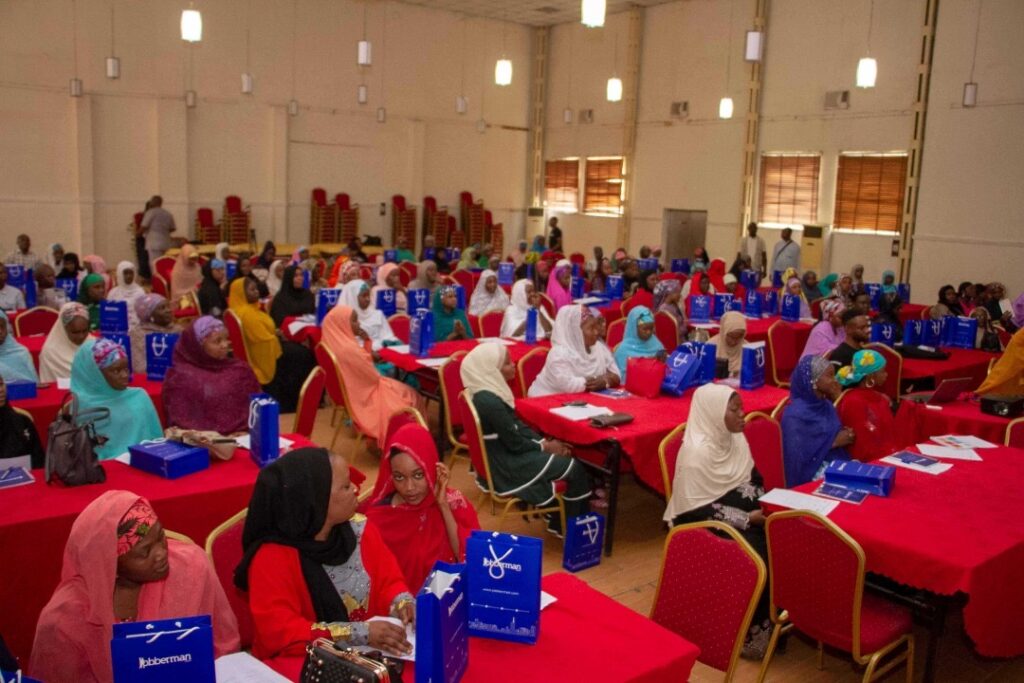Assessing Jobberman’s initiative in bridging Nigeria’s skills gap


Unemployment is high among Nigeria’s youth population. This age demography (15-35 years) accounts for about 50% of 200 million population. To avert unemployment escalation and its dangers, Nigeria can leapfrog education and up-skill its youth for appropriate jobs through Online education especially as Covid-19 has engendered New Normal. This report assesses Jobberman’s intervention in this regard.
Late last year, at the 31st convocation of the Federal University of Technology, Akure, Ondo state, President Muhammadu Buhari expressed worry on the uncomplimentary remarks by employers of labour that Nigerian graduates are not employable. The sweeping assessment simply means these employers of labour find it difficult to fill critical vacant positions to drive transformations.
While this challenge has implications for the smooth running of the companies and growth of the economy, it is obviously one of the factors swelling Nigeria’s unemployment rate presently at 23.1%. “This means that about 50 million out of the 200 million population do not have jobs.
Some of those that have jobs are not appropriately fitted for the jobs. Unfortunately, the youth (those within the ages of 15-35 years) who form about 50% of the population account for the highest number of unemployed out of which 25 million graduates are said not to have jobs”.
A source from Jobberman’s initiative said that yearly, Nigerian tertiary institutions churn out many graduates, some of who are ill-prepared both in character and content for their own jobs or white-collar jobs.
According to the source, as at last year, there were 174 universities (43 Federal Universities, 52 state Universities and 79 private Universities). Nigeria also has 134 recognised Polytechnics in Nigeria (29 Federal Polytechnics, 48 state Polytechnics, 57 private Polytechnics. Many of these institutions are poorly funded and they run on old models, a development which causes them to give birth to ‘poor’ students.
“In the last few years, Nigeria has made strides to attract investments and equally encouraging local investments. These multi-billion dollar investments in various sectors of the economy that are competing in the global village need knowledgeable, hard-working, and articulate employees to handle tasks for the companies’ growth. It is not only about credentials, but having personable, cultured, confident and well-groomed individuals to represent the companies.
While speaking at the convocation, Buhari who was represented by Suleiman Yusuf, the Deputy Executive Secretary of the National Universities Commission (NUC) tasked the universities in the country to ensure that their graduates are employable.
“As it is and with the existing wide gap between employers’ demand and employees, the task of making Nigerian graduates, job seekers and workers fit into the new workplace environment is a task not only for Nigerian universities alone”.
Jobberman’s intervention
It was in this connection that Jobberman, Nigeria’s foremost recruitment platform that helps employers and job seekers solve their recruitment and employment challenges recently introduced its world-class online soft skills training, designed to up-skill Nigerian youth between the age of 18 and 35 with the necessary soft skills needed in the workplace.
Ordinarily, some University graduates and other job seekers may qualify academically for certain jobs, but they need certain non-technical skills to be recruited or retained on the jobs and this is where Jobberman, driven by tested managers, is filling the gap that some universities don’t offer.
Jobberman, led by Hilda Kabushenga-Kragha who has worked in global consulting organisations including KPMG and McKinsey, understands how the Nigerian job market works.
READ ALSO: Jobberman introduces skills assessments add-on for employers to test for the best
The firm is playing this critical societal role in career services to enable young Nigerian graduates secure their dream jobs. Having the right skills for the job is beyond a university degree. Many employers are looking for employees who have the necessary soft skills that make them better individuals in the workplace and can compete globally.
Soft Skills, commonly defined as non-technical skills, enable individuals to interact effectively and cooperate better with others. These skills are vital to organizations and can impact culture, mindsets, attitudes, and behaviours throughout an enterprise.
Participants who take part in the Jobberman Soft Skills training get certificates which can be presented to many employer partners looking to hire qualified candidates. So far, it is said that over 20,000 people have
participated in the first Jobberman Soft Skills post-training assessment and many of them have started getting jobs after the programme.
Jobberman’s career up-skilling has become significant in today’s Nigeria as many Nigerian higher institutions have remained stuck to the past as they are yet to integrate the necessary skills that are in high demand by the labour market into their curriculum.
Most courses are still taught theoretically without practical experiences and this makes the average graduate not appropriately fitted for the demands of the present labour market, hence leading to poor labour performance.
Underscoring the Jobberman Online approach
The present time, more than ever, re-enforces technology as the backbone of business, education and the economy. Every other sector; finance, agriculture, entertainment and even government must thrive on technology. Education cannot be left out.
The lockdown, social distancing occasioned by Covid-19 pandemic has further underscored technology for business, education and relationships.
Jobberman was therefore proactive in its introduction of Online training by using a blended approach of training its student via Zoom and engaging with them further via the messaging app, telegram.
While the Federal Government has shut down schools to slow the spread of the virus, education cannot be shut down and this is only possible through Online training, as introduced by Jobberman.
Ordinarily, Jobberman has evolved beyond the traditional placements of employees to leveraging more on technology to develop data-driven solutions that will up-skill job seekers and make them compete globally.

Testimonials by empowered job seekers/workers
The impact of this training has been felt by youths all over Nigeria and their testimonies are revealing.
One of the beneficiaries, Folakemi Dare- Ojulari joined the Jobberman Soft Skills Training in June 2020. She had been job hunting for about six years and decided to take part in the training to improve her chances.
One month after her training, she not only got certified but applied for jobs and got two job offers to choose from. Folakemi believes that Jobberman is the key to her success as the classes boosted her morale and made her successful in her interviews after 6 years of searching.
Another beneficiary, Sadiat, is a prospective community leader in Kano. She is currently running her own small project for youths in her community. Her project aims at teaching youths in the north employability skills with a major focus on self- discovery and leadership skills.
She expressed her excitement at finding out about the Jobberman soft skills training and took it as an opportunity to further deepen her knowledge on soft skills so that she can have more impact on others.
READ ALSO: Job seekers rise to 50,000 weekly on Jobberman – Hilda Kragha, CEO Jobberman
She couldn’t contain her joy as she spoke about the impact the training had on her and how she hopes to spread the knowledge she acquired on “emotional intelligence” – In her words, “this is something everyone should know”. Now, she fully understands the need for soft skills as distinct from technical skills.
Ayoola, a visually impaired man who works as a Radio Journalist and Producer is also a beneficiary of Jobberman up-skill course. He has brilliantly mastered the art of utilizing technology to learn and work and his passion to learn led him to apply for the Soft Skills training.
After the training, he couldn’t help but testify that he has noticed a tremendous improvement in his self-confidence and awareness. He stated that his fear of “PowerPoint presentations and storytelling have been broken down”. Beyond his personal gains, the training has provided a platform for him to project a positive image of the blind community.
He hopes his participation can demystify the notion that disabled people can’t match up to everyone else, and also encourage young people like himself to perceive Jobberman as a partner in their search for a profitable future.
Nigeria’s population has continued to rise and it is said that in the next 30 years, the population will hit 400 million from 200 million today. Over 50% of this population will be the youth.
This is the time therefore to up-skill the youth from formative level to higher education. It is also important to incorporate relevant curricula for self-employment or appropriate for other
jobs to avert dangers. Jobberman’s intervention in up-skilling job seekers for the global competition is significant in this regard.
The post Assessing Jobberman’s initiative in bridging Nigeria’s skills gap appeared first on Vanguard News.
No comments: